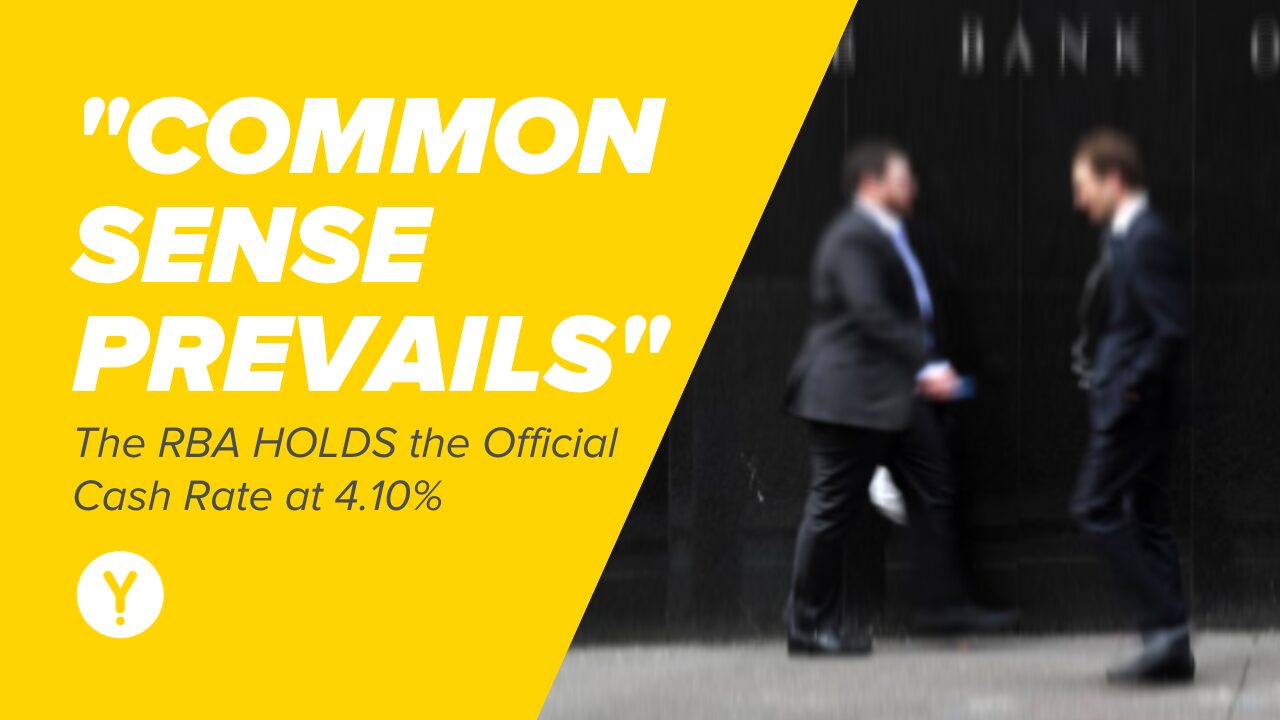In this article:

The Reserve Bank of Australia has decided to HOLD the official cash rate at 4.10%.
Why?
After 12 rate increases in the past 14 months, the RBA announced in its press release that: “Higher interest rates are working to establish a more sustainable balance between supply and demand in the economy and will continue to do so. In light of this and the uncertainty surrounding the economic outlook, the Board decided to hold interest rates steady this month.”
“This will provide some time to assess the impact of the increase in interest rates to date and the economic outlook.”
The RBA acknowledged that inflation showed signs of declining for the month of May and that it is officially “past its peak”.
The RBA further acknowledged that whilst some “households have substantial savings buffers, others are experiencing a painful squeeze on their finances.”
Is it all good news for borrowers? It depends. There was still a warning of the potential of future rate hikes “to ensure that inflation returns to target in a reasonable timeframe, but that will depend upon how the economy and inflation evolve.”
Leading economist, Stephen Koukoulas, said that the debate had by the RBA board this week boiled down to a simple question: “Is a 4.1% Official Cash Rate sufficient to get inflation lower?”
The answer: Potentially.
Mark Bouris said that he interpreted the RBA’s language as meaning they’re “finally getting the message that people are really suffering, people are really hurting out there, and maybe the data is starting to reflect similar sorts of outcomes, as to what sentiment is really indicating.”
Bouris also said that the RBA might be finally “starting to listen” to consumers, the media and economic analysts that have called for a pause in rate hikes, “to see what the outcome of the 4.00% of interest rate increases have already had on the economy.”
It’s hard to say with certainty whether the rate hiking cycle is ‘over’, however, for at least the next month, interest rates will remain steady.
The cost of rate hikes to date
Whilst borrowers across the country will like breathe a sigh of relief, this pause in a record-setting rate hiking cycle has left borrowing costs at their highest level since April 2012.
For homeowners, business owners, and those across the country with mortgage commitments, the financial toll since May 2022, when rates began to rise, is staggering: repayments on an average Australian home loan have increased 59%.
| Month | Interest Rate | Monthly Repayment | RBA increase | Cumulative Monthly Increase | Percentage increase over May repayment |
| May-22 | 2.50% | $2,370.73 | 0.25% | 0 | 0 |
| Jun-22 | 2.75% | $2,449.26 | 0.50% | $78.53 | 3% |
| Jul-22 | 3.25% | $2,610.26 | 0.50% | $239.53 | 10% |
| Aug-22 | 3.75% | $2,776.51 | 0.50% | $405.78 | 17% |
| Sep-22 | 4.25% | $2,947.80 | 0.50% | $577.07 | 24% |
| Oct-22 | 4.75% | $3,123.94 | 0.25% | $753.21 | 32% |
| Nov-22 | 5.00% | $3,213.72 | 0.25% | $842.99 | 36% |
| Dec-22 | 5.25% | $3,304.53 | 0.25% | $933.80 | 39% |
| Jan-23 | 5.50% | $3,396.36 | 0.00% | $1,025.63 | 43% |
| Feb-23 | 5.50% | $3,396.36 | 0.25% | $1,025.63 | 43% |
| Mar-23 | 5.75% | $3,489.17 | 0.25% | $1,118.44 | 47% |
| Apr-23 | 6.00% | $3,582.94 | 0.00% | $1,212.21 | 51% |
| May-23 | 6.00% | $3,582.94 | 0.25% | $1,212.21 | 51% |
| Jun-23 | 6.25% | $3,677.28 | 0.25% | $1,306.55 | 55% |
| Jul-23 | 6.50% | $3,772.52 | 0.25% | $1,401.79 | 59% |
| Aug-23 | 6.50% | $3,868.62 | 0.00% | $1,401.79 | 59% |
**Disclaimer: Original Loan amount: $600,000. Loan settled May 2022. Starting Variable rate: 2.5%. Rates increase in line with RBA Decisions. New repayments calculated on the reducing loan balance over the remaining term of the loan and new interest rate. The information is provided by Yellow Brick Road Finance Pty. Limited ACN 128 708 109 Australian Credit Licence 393195 and does not take your personal objectives, financial situation or needs into account. Consider its appropriateness to these factors before deciding whether to act on it. WARNING : This comparison rate is true only for the examples given and may not include all fees and charges. Different terms, fees or other loan amounts might result in a different comparison rate.
Recession fears may have come too early
One of the most respected economic commentators in Australia and Chief Economist at Westpac, Bill Evans recently pointed to a key issue across the globe: Central banks across worldwide have arguably, have had limited control of high levels of inflation, not just here in Australia.
Evans said: “One of the big themes to emerge from my recent conversations with customers and officials in the US and Europe was that the effectiveness of monetary policy in curbing inflation has been disappointing.”
“Economic trends that emerged from the pandemic, including tight labour markets, the accumulation of excess savings, as well as a high level of fixed rate loans in the system, have combined to dull the impact of higher interest rates in many jurisdictions.”
Put another way: central banks, such as the RBA have attempted to ease inflation by raising rates, and it simply hasn’t worked. At least not in the manner that economists working for these central banks have expected.
Mark Bouris and Stephen Koukoulas pointed this out on Property Insights, emphasising the blunt nature of interest rates in controlling inflation. Koukoulas argued that inflation is caused by many things, overspending by governments, increases in wages, very low unemployment levels, supply chain issues increasing the cost of goods, productivity issues, we could go on and on.
“But raising interest rates won’t fix that,” said Koukoulas.
“Just as raising rates won’t fix the Ukraine-Russia conflict, nor supply chain issues.”
“And don’t take your eye off small businesses. For mortgage holders, it’s undoubtedly painful when you’re forking out hundreds and hundreds, if not thousands of dollars per month more, because of rate hikes, but also, a lot of small businesses have got an overdraft, often linked to the house.”
“So that stress level is being compounded by these rate hikes, and when you look at what Bill Evans, from Westpac, his measure of consumer sentiment, it’s lower now than during the COVID pandemic, lower than during the global financial crisis. And it’s as low as it was in the 1990 recession when unemployment got to 11%.”
So what happens next? Do we go the way of New Zealand and enter into a recession?
According to Evans, Westpac is “not expecting a technical recession – defined by two consecutive quarters of negative growth.”
“So, the Australian economy is in for some difficult times ahead, particularly around the weak consumer sentiment. That will be the key theme for the next couple of years as this long run of interest rate hikes really starts to bite.”
Feeling stressed?
We asked YBR Home Loans Mortgage Broker, Alan Khaw for some guidance to borrowers who are struggling to meet the requirements of the rising mortgage commitments. Alan said:
“With so many rate rises already, homeowners need to ensure they don’t panic. As long as you have a job or income coming in, there are ways for a mortgage broker to work with your lender to help you manage, whether it be refinancing or other options.”
“It’s never too late to take control of your situation. Borrowers need to focus on what they can control, which is reaching out to their mortgage broker, who can stand up for you and fight for your best interests, whilst you remain focused on your day to day.”
Whether it be exploring your options to refinance, or putting you in contact with expert financial advisors to work on a plan of action to see through a difficult period, and put together a budget plan, a mortgage broker exists to ensure you get a fair go on your home loan.
Reach out to us today to have a conversation.



